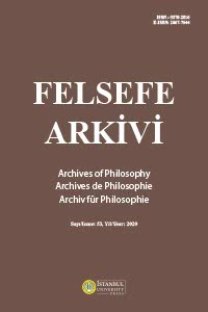Vicdan, İtaat ve Otoritenin Kısa Bir Tarihi
Vicdan, İtaat, Otorite, Synderesis, John Locke, Thomas Hobbes, Stanley Milgram, Erich Fromm, Agnes Heller
A Short History Of Conscience, Authorty And Obedience
Conscience, Obedience, Authority, Synderesis, John Locke, Thomas Hobbes, Stanley Milgram, Erich Fromm, Agnes Heller,
___
- Adam Smith, The Theory Of Moral Sentiments, Liberty Fund, Indianapolis, 1984.
- Agnes Heller, A Philosophy of Morals, Basic Blackwell, Massachusetts, 1990.
- Agnes Heller, General Ethics, Basic Blackwell, Massachusestts, 1990.
- Aristotle, Nicomachean Ethics, Translated an Edited By Roger Crisp, Cambridege, Cambridge University Ptess, 2000.
- Douglas Langston, The Spark of Conscience: Bonaventure's View of Conscience and Synderesis, Franciscan Studies, Volume 53, 1993, pp. 79-95.
- Elizabeth M. Pybus, Saints and Heroes, Philosophy, Vol. 57, No. 220 (Apr., 1982), pp. (193-199)
- Erich Fromm On Disobedience: Why Freedom Means Saying “No” To Power, Perennial Modern Thought Edition Puplished, 2010.
- Erich Fromm, Erich, Man for Himself: An Inquiry Into the Psychology of Ethics, Routledge, 2002.
- Franco Ferarotti, International Journal of Politics, Culture, and Society, Vol. 8, No. 1 (Autumn, 1994), pp. (105-127)
- Hobbes's Leviathan, Reprinted From The Edition Of 1651 With An Essay By The Late W. G. Pogson Smith, Oxford At The Clerandon Press, London, 1965.
- Immanuel Kant, An Answer to the Question: What is Enlightenment? (1784), In, Immanuel Kant, Practical Philosophy, Translated And Edited By Mary J. Gregor, General Introduction By Allen Wood, Cambridge Universty Press, 1999.
- Immanuel Kant, Kant on Education, With an Introduction By C. A. Foley Rhys Davis, M.A., D. C. Health&Co., Publishers, Boston, 1900.,
- Immanuel Kant, Religion Within The Boundaries Of Mere Reason, And Other Writings, Translated And Edited By Allen Wood, George Di Giovanni, Cambridge Universty Press, 1998.
- Immanuel Kant, The Lectures On Ethics, Translated by Louis Infield, Harper&Row, Puplishers, New York, 1963.
- J. O. Urmson, 'Saints and Heroes', in Essays in Moral Philosophy, A. I. Melden (ed.) University of Washington Press, 1958.
- Jack Russell Weinstein, Adam Smith’s Pluralism: Rationality, Education, and the Moral Sentiments, Yale University Press, 1972.
- James R. Otteson, Adam Smith’s Marketplace Of Life, Cambridge: Cambridge University Press, 2002.
- Jery Evensky, Adam Smith’s Moral Philosophy: A Historical And Contemporary Perspective On Markets, Law, Ethics, And Culture. Camridge: Cambridge University Press, 2005.
- John Grumley, The Ethical Imperative, Agnes Heller: A Moralist in the Vortex of History, Pluto Press, 2005.
- John Locke, An Essay Concerning Human Understanding, Dover Publications, INC. New York, 1959.
- John Locke, Assays on The Law of Nature, Edit. By, W. Von Leyden, Oxford at The Clarendon Press, 1954.
- John Locke, Some Thougts Concerning Education, London, 1779.
- Mark Hanin, Thomas Hobbes’s Theory Of Conscience History Of Political Thought. Vol. Xxxiii. No. 1. Spring 2012.
- Max Horkheimer, Studies In Prejudice, Edited By Max Horkheimer And Samuel H. Flowerman, The Authoritarian Personality, By T. W. Adorno, Else Frenkel-Brunsivik, Daniel J. Levinson And R. Nevitt Sanford, Harper, New York, 1950.
- Mihai Androne, Notes on John Locke’s views on education, Procedia - Social and Behavioral Sciences 137 (2014) pp. (74 – 79)
- Paul Strohm, Conscience, A Very Short Introduction, Oxford University Press, New York, 2011.
- Relativism: Interpretation and Confrontation, Michael Krausz(ED.) Notre Dame: University of Notre Dane Press, 1989) Richard Rorty, Solidarity or Objectivity? Richard Rorty, Contingency, Irony, and Solidarity, Cambridge University Press, 1999.
- Richard Sorabji, Moral Conscience through the Ages: Fifth Century BCE to the Present, The Universty of Chicago Press, Chicago, 2014.
- Shannon L. Mariotti, Adorno and Democracy, Chapter Title: Democratic Pedagogy: Resistance and an Alternative Model for Civic Education, University Press of Kentucky, 2016.
- Stanly Milgram, Obedience To Authority: An Experimental View, Tavistock, Harper And Row, Puplishers, 1974.
- Teresa M. Bejan, Teaching the Leviathan: Thomas Hobbes on Education, Oxford Review of Education, Vol. 36, No 5, October 2010, pp. (607-626)
- Thomas Hobbes, De Cive, Edited by Howard Warrender, Oxford At The Clerendon Press, 1987.
- Thomas Hobbes, The Elements of Law Natural and Politic. Edited With A Preface And Critical Notes By Ferdinand Tönnies, Simpkin, Marhall, and Co., London, 1889.
- Timothy C. Potts, Conscientia in Medival Philosophy, Cambridge University Press, 1980.
- Wehan Murray Coombs, Contingency, Irony and Morality: A Critical Review of Rorty’s Notion of the Liberal Utopia, Humanities 2013, 2, pp. (313–327).
- Zygmund Bauman, Collateral Damage: Social Inequalities in a Global Age, Polyt Press, 2011.
- Zygmunt Bauman, Modernity and The Holocaust, Polity Press, 2008.
- ISSN: 0378-2816
- Yayın Aralığı: 2
- Başlangıç: 1945
- Yayıncı: İstanbul Üniversitesi
Vicdan, İtaat ve Otoritenin Kısa Bir Tarihi
Baumgarten Felsefesinde Estetik ve Mantık
Dil ve Politika İlişkisi Üzerine Bir Soruşturma: Dilin Politik Felsefeye Sağlayabileceği İmkânlar
David Kaplan’da Bağlam Duyarlı Terimlerin Anlambilimi Üzerine
Rakip Paradigmalar: Alman Felsefesinin İstanbul Üniversitesi'ne Girişi
